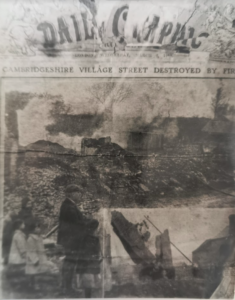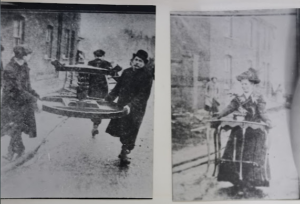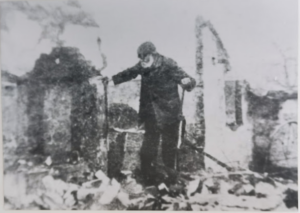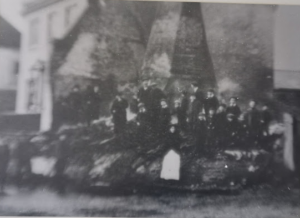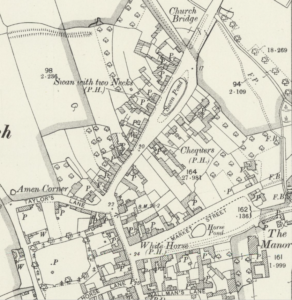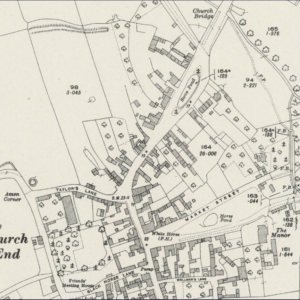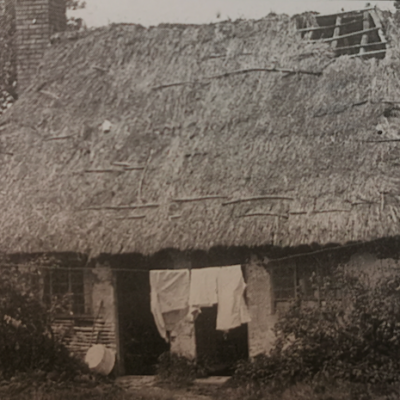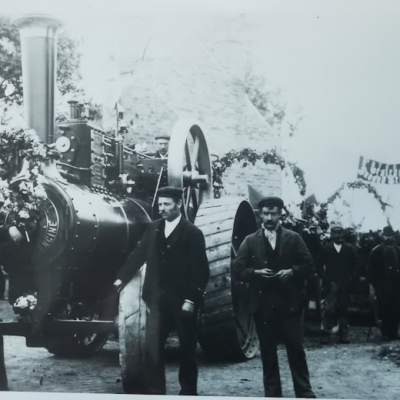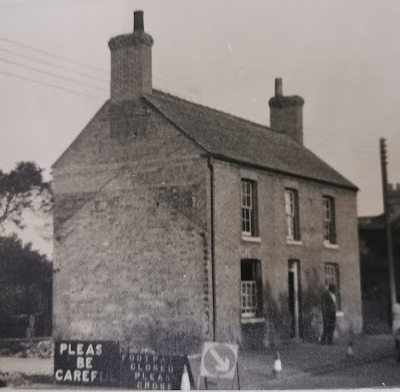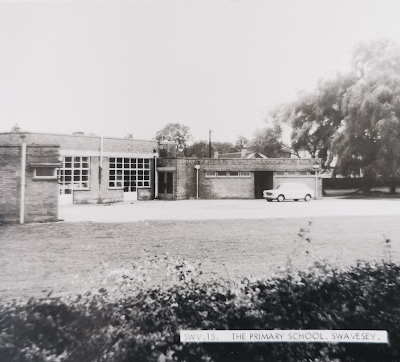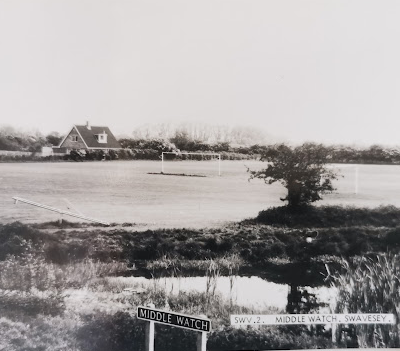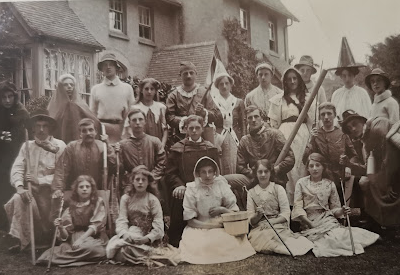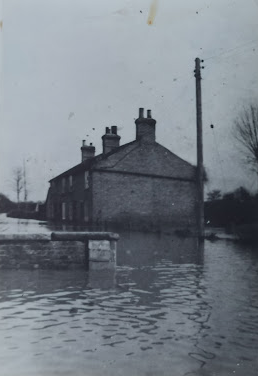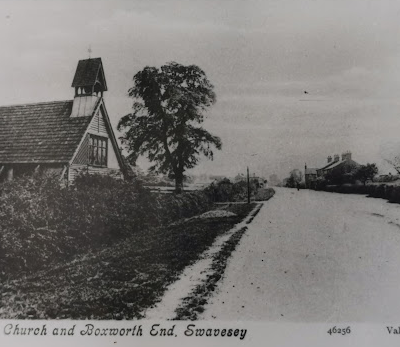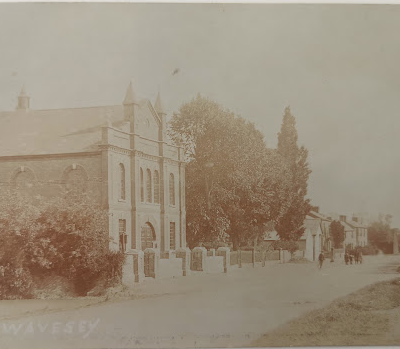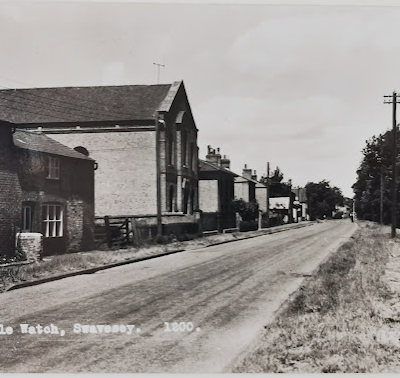Search by topic
- archaeology
- architecture
- bricklayer
- Building of Local Interest
- carpenter
- church
- crime
- dressmaker
- fire
- Great Eastern Railway
- listed building
- medieval
- oral history
- Public House
- Rattee & Kett
- Religious House
- Roman
- scholar
- school
- Then and Now
- tudor
- women
- work
- world war one
- world war two
Search by text
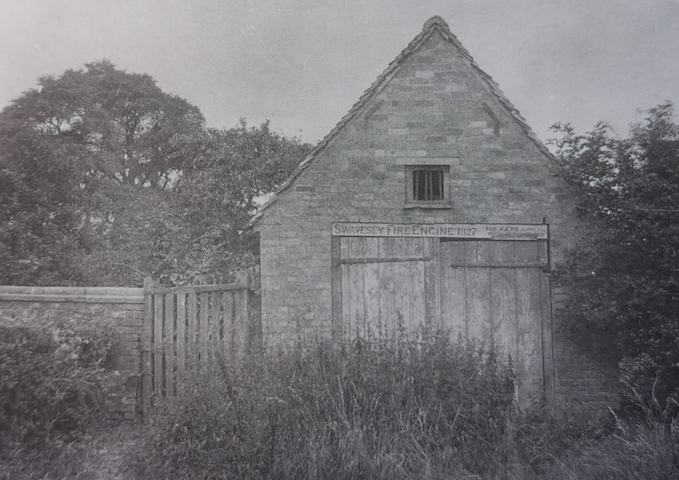 Swavesey Fire Engine House, 1933 (photo P Salmon) (Cambridgeshire Collection)
Swavesey Fire Engine House, 1933 (photo P Salmon) (Cambridgeshire Collection)The Swavesey Fire 1913
History of the Swavesey Fire 1913
1899
The CDN 4.9.1899 reported that the pump was called out, positioned next to a pond, but was found to be useless.
1913
Cambridge Independent Press Friday 7 March 1913
DISASTROUS FIRE SWAVESEY
Thirty Houses Destroyed Two Hours
DISTRESSING SCENES
Seventy People Rendered Homeless
RELIEF FUND OPENED.
A terrible disaster has befallen the village Swavesey, a fire which broke out on Monday resulting in the destruction of some thirty houses, and thus rendering close on 70 people homeless. The outbreak was discovered about two o’clock, but, aided by the high wind the flames spread with extraordinary rapidity from house to house, and in about two hours the whole of the buildings were destroyed. The portion of the village known as Church End, near the Railway Station, has been almost wiped out. The sufferers of the calamity are almost entirely people of the poorer working classes, many of whom were uninsured.
Origin of the Fire
The fire is supposed to have originated in the roof of Mr. George Hepher’s house, in Taylor’s-lane, through a spark from chimney being blown on to the thatch. When first observed the thatch was well alight, and although several members of the family rushed upstairs and commenced to remove the goods upon which they set most value, the flames were through the roof and the house ablaze almost before they could decide what to take first, and, as a result, they were among the worst sufferers from the fire.
It was only a matter moments before the wind had ignited the roof the adjoining the old Railway Tavern, occupied by Mr. Alfred Prime, and fanned by the wind the two houses burst into a tremendous sheet of flame. Burning pieces of thatch were flying through the air at once, and as Mr. R. Williamson’s large barn, stables and other outbuildings on the opposite side of the lane were most directly in the path of the wind, and were of wood and thatch, they were the next to catch. This linked up the fire with the junction of High-street and Church End, and it was apparent at once that unless the wind dropped or the rain, promised by a clouded sky, fell, the doom of Church End, studded as it was with old thatched houses and plaster and wood, was sealed beyond redemption. A fine, long-haired cat, belonging Mr. Williamson, was badly burned, and was afterwards- killed to put it out of pain.
An Awe-inspiring Scene
Two old cottages at the corner next to Mr. Williamson’s buildings, and tenanted by Messrs Samuel Daisley and Fred Dodson, were the next to fall victims, and here again the flames got a hold with marvellous rapidity. Mr. Dodson was in bed at the time the outbreak, and had to be aroused order to escape the flames. By this time efforts were being made to clear the furniture and effects from the houses in the path of the the flames, but so rapid was the progress of the fire that it was impossible completely to clear any of the houses, even those comparatively speaking at a distance, before they were licked up and devoured by the flames. Eye-witnesses at this period describe the scene as wonderful and awe-inspiring to an extraordinary degree, the flames appearing to spread from house to house almost as quickly as one could walk down the street.
Spreading down the left side of the street, at first by outbuildings at the back of the houses, the flames soon leaped right across the road, and ignited the thatched house and farm buildings tenanted by Mr. John Dodson, and although most of the live stock were got out with great promptitude and same of the furniture removed from the house, the whole buildings were ablaze long before the work could be completed, and a number of fowls had to be left to perish.
Willing Helpers
The flames were now literally leaping down the street on both sides towards the railway station, and the spectacle was at once a grand and terrible one. The intense heat from the burning buildings both sides, with the dense clouds of black choking smoke, and the patches of burning thatch and fragments of wood which filled the air, made the road practically impassable, but scores of willing helpers faced the danger and discomfort bravely, and did their best to assist their stricken neighbours. P.C. H. Plowman was one of the first on the scene, and he was soon joined by Sergt. Day, of Longstanton, and other officers from the surrounding villages, while Deputy Chief Constable Webb came from Cambridge in response to a telegram, and superintended the valuable efforts made by the police to rescue property in danger, and to regulate the crowd.
Although the conflagration was not, of course, seen so readily from the surrounding country as would have been the case with a night outbreak, the smoke was visible for a considerable distance, and crowds of people came from St. Ives and the neighbouring villages. After considerable delay the Swavesey Fire Brigade turned out and commenced to play on the burning houses with their manual engine. There appeared to be some difficulty at first with regard to working from the public water supply, but eventually the Brigade worked from the Swan Pond. St. Ives Brigade, with another manual, arrived later in the afternoon, and Huntingdon, with a steamer, in the evening. Among prominent local residents who assisted were the Vicar (the Rev. J. S. Sharp), Dr. Ellis (County Councillor), Mr. E. Parish (J.P. and Guardian), the Rev. J. F. Cooksey, Mr. W. C. Cole, Messrs. A. Day (Chairman of the Parish Council), J. Linford, A. R. Norman, J. S. Goad, Twist and Burton (Parish Councillors). Mr. Cooksey who was conspicuous among the helpers by his great height, set a brilliant example. He rescued furniture and poultry, in one instance carrying a large sofa some distance on his back and carried a great deal of water.
Brick Houses Escape
On the east side of the street the fire next attacked Mr. W. Burton’s buildings, which, being mainly of wood, were consumed very rapidly. Two substantial brick houses occupied by P.C. Plowman and Mr. Robinson Mitham, carpenter and builder, escaped. Mr. Mitham’s workshop caught alight, but was speedily extinguished. Two old thatched cottages tenanted by Miss Rebecca Thorp and Cllr. H. Wells, caught almost simultaneously, and were hopelessly ablaze in a few moments. The next house to be devoured was an old thatched house purchased last autumn by the Misses Frere on account of its picturesque appearance. Its very age and picturesqueness was its undoing, and it burnt like tinder. A substantial brick house, occupied Mrs. Wimpress, although immediately adjoining the blazing cottage, escaped, its walls being scarcely warm. Two old thatched cottages, tenanted Mr. W. Ding and Mr. J. Martin, were totally destroyed, but Mr. George Green’s brick house escaped, though not the outbuildings.
On the west side Mr. Williamson’s butcher’s shop, at the corner, got ablaze, but was extinguished to a great extent for the time being, only to fall victim later in the afternoon. Mr. Rowcliffe’s house was destroyed, with old cottages, tenanted by Miss Rebecca Thorp and Gillings. Mr. A. J. Willson’s brick and slated house escaped destruction, but kept smouldering, and was very seriously damaged later in the day. The house of Mr. Ben Thorp, the well-known cyclist and skater, stood next in the path of the flames, with workshops
[The following section is illegible on the BNA scan]
and evele and motor stores at the back. All the buildings were alight before the rescuers had had time to remove very much, but the more valuable part of Mr. Thorp’s stock-in-trade was saved. with, it is hoped, the greater part of the valuable cups and other trophies be has won in various sporting events. Mr. Thorp himself was away in London. A row of four red brick houses, occupied by Mr. Chas. Garner, Mr. John Gilbey, Mr. W. Fester and Mr Williamson were now directly in the path of the flames but although they were sadly damaged by heat and water they escaped destruction.
Condemned Cottages Burnt
A less painful spectacle was the burning of the next group of houses. These were four old cottages which had been condemned, and were standing empty- and needless to say they offered no practically resistance to the flames, and were entirely wiped out. The next six cottages, all thatched and rather ancient, were occupied by Mrs. Rebecca Eason, Mr. James Wells, Mr. James Taylor, Mrs. Hannah Ding, Mr. J. Kester. jun. and Moses Marriott. With the terrific blaze created their moribund and untenanted neighbours, tbev bad chance, and were destroyed before their terrified occupants could more rcniov. the -cmhl- mo.-t prized. The Swan With Two Necks publichouse was saved, with the adjoining house occupied Mrs. Godfrey, but two iiitit.li and plaster cottages tenanted by Mrs Howlett; and Mr. W. Cain were wiped out. A tremendous blaze raged at this point, near the Swan pond, and the backs of the houses particular were devoured with marvellous speed. Mr. Twist’s house, was saved, although adjoins The burning cottages, but two rooms were damaged by fire. Some of his outbuildings were burnt, and at time the house appeared in considerable danger, but the Swan i>ond front, so that it was easy matter it with water. Some poultry
[The next section is clear on the BNA scan]
and the outbuildings were removed to a safe place before the fire reached this point.
This marked the extent of fire, not because it was not as menacing as ever, for indeed the blaze was most furious at this period, with practically the whole street burning at once. The fire was checked simply because there was wide gap between the burning houses and the next dwelling. The wind was strong that the safety of the Manor was feared for and the Swavesey engine was taken to play on the stacks and outbuildings there, as showers of sparks for burning fragments were being blown that direction. In the meantime the St. Ives engine was being used to guard against the further spread of the fire. There was absolutely no hope of extinguishing any of the burning houses. Where a well-appointed steam-engine would have been practically powerless, it was obvious that the manual could do nothing beyond watch for the outbreaks continually occurring on houses which had hitherto escaped.
Desolation
At five o’clock there was very little brilliant flame, the whole of the houses having been destroyed in about two hours. The scene presented remarkably desolate and impressive appearance. For a long distance the street was enveloped in a cloud of dense, pungent smoke, and on each side the places which had been occupied by houses whose tenants were enjoying their mid-day meal not three hours previously were wastes of smouldering embers and blackened brickwork. As twilight began to fall a row chimney stacks, where some half-dozen cottages had been destroyed, towered over the ruins, a line of sombre sentinels in a setting of glowing masses and showering sparks. The older people who had been rendered homeless appeared to be absolutely dazed and stupefied by the calamity which had befallen them. One poor old fellow, an old age pensioner, who had lost his little all, without having anything insured, was walking to and fro with a picture in each hand, unwilling to trust these trifles, saved from amongst a house of furniture, to the kindly neighbours who offered them shelter. Here and there the flames were extending from a smouldering building along a garden fence, creeping up the side of a shed, but the owners, already rendered homeless, and staring with haggard faces at the smoking piles which represented the ashes of their homes and of their hopes, were literally incapable of the effort required to extinguish these miniature conflagrations, which were ultimately trampled out bystanders.
The People’s Misery
Earlier, when the light of the blazing houses had shown hundreds of people rushing with furniture and household goods from the houses already alight or in the path of the flames, the scene had been a brilliant, although terrible one, but when the flames died down and darkness fell the spectacular glory faded from the minds of the onlookers, and the scene of ruin and destruction accentuated the misery depicted on the faces of those who stood around the smoking piles.
The extraordinary manner in which the few articles which had been saved were dumped down bore testimony to the state of mind of their owners. Passing down the darkened street, one stumbled here and there over a little heap of chairs and pictures, or a bundle of household linen blackened by smoke and soaked with water. In several instances goods were moved from burning houses to the outbuildings of adjacent premises, only to be barely saved again when the buildings they were in their turn destroyed.
[The next section is illegible on the BNA scan]
It would have been well if the heavy shower of rain which fell about o’clock had come a few hours earlier, but although there were slight showers at neighbouring villages and in Cambridge during the afternoon, scarcely a drop fell on Swavesey until seven o’clock. Then there was a drenching storm and the wind which had raged all day and had been mainly responsible for the calamity dropped to a calm. This aided the brigades and other helpers a great deal, but there was element of danger until far into the night. Furniture was removed from the houses on the north side of Market-street, as it was feared they would get alight.
Parish Documents in Danger
At midnight a heap coal and coke the yard Mr. James Wells, coal merchant, whose house had previously been destroyed, was seen to be well alight, and was only extinguished with great difficulty, and fruit trees Mr. W. H. Key’s garden, close the cottages first attacked, were destroyed. Robinson Mitham’s house and workshop had a narrow escape. P.C. Plowman saw that the roof between the workshop and office was well alight, and he obtained a ladder and extinguished the flames with buckets of water. Mr. Mitham Clerk to the Parish Council and other bodies and Assistant Overseer, and a number valuable documents and parish records were in danger. As already stated, the fire had progressed from house to house during the afternoon with such wonderful rapidity that it was impossible to make a gap pulling down buildings or to save any the houses except the newer brick ones by playing on them with water, but one smart piece work led to the saving of Messrs. Hudson’s house, the Little Rose. The tenant, assisted by Messrs Wadsworth’s vanman, David Sneesby, and others, pulled down the woodwork which connected some blazing cottages with the Little Rose, and saved the house.
[The next section is legible]
The Swavesey Fire Brigade was commanded by Mr. S Challis. The St. Ives Brigade arrived about 4 o’clock. Lieut. James bringing about eight men, and Capt. F. Giddings following by train. The Huntingdon Brigade, with their steam engine, got away from Huntingdon within ten minutes of receiving the call and arrived about 7 o’clock, twelve men being commanded by Capt. Barber and Lieut. Burbridge. The police duty were Deputy-Chief Constable Webb, Sergt. Day (Longstanton), P.C.s Plowman (Swavesey), Richardson (Boxworth), Breed (Willingham) and Bell (Over). The Fire Brigades and police remained on duty all night, and at daybreak the work of falling chimneys commenced. In the meantime the engines continued to play on the smoking ruins. This work had to be continued throughout the day.
Painful Incidents.
There were many strikingly painful incidents in connection with the fire. At one house all the furniture was destroyed, and the wife the occupant was weeping bitterly. Inquiry elicited the fact that a painful coincidence had occasioned her grief. Exactly a year ago that day she had lost a grown-up daughter, and a portrait of the dead girl which she treasured greatly, and which could not be replaced was destroyed in the flames. The stricken families were looked after to some extent by their more fortunate neighbours. In some houses accommodation was found for individuals, and blankets and bedding were lent to others, but a great many were still left without shelter, and arrangements were made by Mr. Parrish for the older and poorer people to taken to the St. Ives Workhouse for the night.
The bestowal of the rescued property was naturally accomplished hurriedly, and the heaps of furniture in various places contained articles belonging to many different owners, all mixed up together and apparently presenting a gigantic problem in the sorting out. A tradesman whose premises were filled with goods declared that he had not the remotest idea to whom a single article belonged. Many things were piled the roadway, and one large pile was placed in an archway between two partially houses.
Messages of Sympathy
Several letters and telegrams of sympathy have already been sent to the stricken village, but practical help is urgently needed. The village was short of housing accommodation before the catastrophe, and houses must be erected as quickly as possible, while many of the sufferers are, as already stated, completely uninsured, and have absolutely no means either of finding homes or of replacing their furniture. A number of old age pensioners were among the sufferers and there was great perturbation because their pension ……
[The next section is illegible on the scan]
forms were destroyed. Two pensioners, Joseph Gillings and James Martin, were taken to St. Ives Workhouse, and were seen there this ‘.Tuesday.) morning by Mr. A. , Day, Guardian. They were then comfortably csconsed in bed. is the oldest man in j Swavesey, and is nearly 90 years of age. A . statement has been m-ide that the school and chapels were used to provide sleeping accommodation the homeless, but this incorrect- During the whole of Tuesday visitors poured into the village motor cars, traps, cycles, and train. Motorists, and fact most visitors, contributed liberally to the Relief Fund, some adding their names to the subscription lists whilst others put their donations into collecting boxes. Men were on duty on the scene of the fire throughout Tuesday night, with the parish fire engine. Ruins continue and during the night broke out here and there. The engine was not usedi standpipes and buckets of water being sufficient. There was a curious “find” at Mr. Horace Wells’ house on Tuesday. When the fire broke out a saucepan containing a plum pudding was the kitchen fire. On Tuesday the blackened and burned saucepan was discovered, with the basin intact, but the pudding was reduced cinders and tbe cloth was ashes.
There is nothing so sure as the unexpected; be warned. INSURE AT ONCE in Liverpool, London and Globe Insurance Company. Claims settled promptly. Agent, H. S. ALDRED, London House, Swavesey.
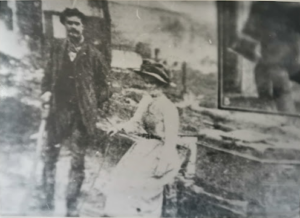
Mr and Mrs Sid Wright; house destroyed and only their bed saved. Survived and raised 8 children. (Alan Lee Swavesey collection)
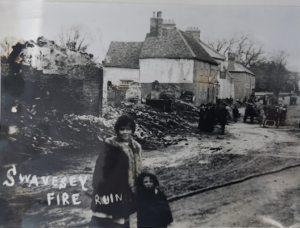
Looking towards church day after 1913 fire. Horse drawn fire engine (r) (Alan Lee Swavesey collection)
RELIEF FUND OPENED
Help for the Sufferers
No one could read the story of the disaster that has befallen the village of Swavesey without being deeply moved by the plight the unfortunate sufferers, who have not only been rendered homeless, but have lost their entire possessions. How many of the victims are insured it is impossible as yet to say, but it may be taken for granted that a number them are not. Being entirely of the labouring class, the blow will be the greater, in that they are without any reserve to fall upon. Even those who may be insured will not be able to recover the whole their losses, and any case, their plight in the meantime is pitiable. A local fund has been opened, and the
[The next section is legible]
following letter has been issued to the Press by the Vicar Swavesey: THE EDITOR. Sir, —You have already heard of the disastrous fire which destroyed some thirty our houses yesterday. Sixty-seven people are homeless; at present most of them have been given a home by kind friends. A fund has been opened to meet the immediate needs of the most necessitous. I have been asked to act as treasurer for the fund. A representative committee is being formed. I shall be much obliged if you will advertise the existence of this fund, and will do what you can to help us. —Yours, etc G. SELWYN SHARP. The Vicarage, Swavesey. Cambs. March 4th. 1913.
The first meeting- of Swavesey Relief Committee was held Tuesday evening at the National School. Mr. Ebenezer Parish. J.P., was appointed chairman, the Rev. J. Selwyn Sharp (vicar), treasurer, and Mr. H. Capper, secretary. It was decided to open an account at once at the Capital and Counties’ Bank, St. Ives, in the names of the chairman, treasurer, and secretary. A Ladies’ Committee was appointed inquire into and deal with all urgent cases of loss of clothing, bedding, etc., and further steps, were agreed upon in regard to other necessitous cases.
In addition to the Swavesey Fund, a Relief Fund has been opened by the “Cambridge Daily News,” and already there has been a generous response.
The committee of the Beaconsfield Club, Gwydir-street. Cambridge, are holding a benefit concert in aid of the sufferers from the fire at the club at March 18th.
Contribute
Do you have any information about the people or places in this article? If so, then please let us know using the Contact page or by emailing capturingcambridge@
License
This work is licensed under CC BY-NC-SA 4.0








